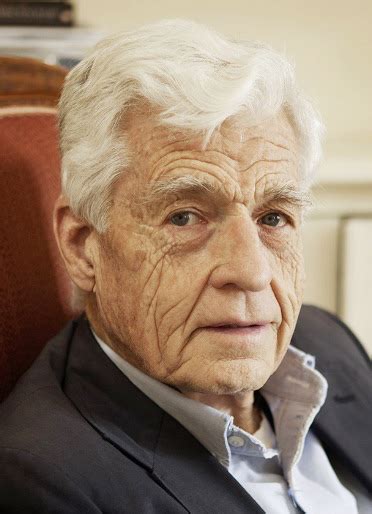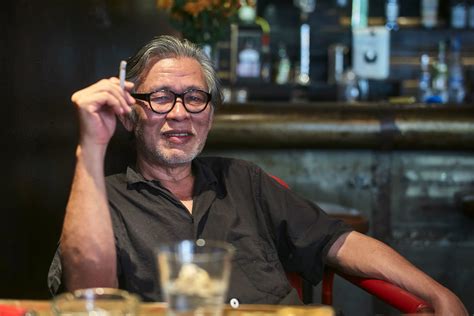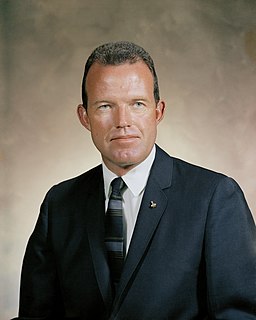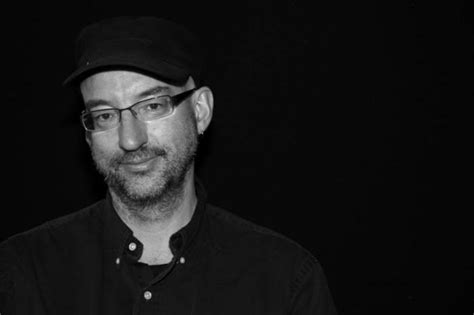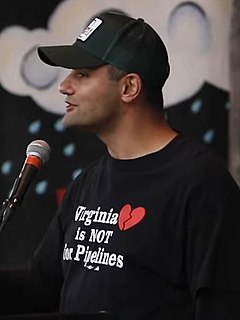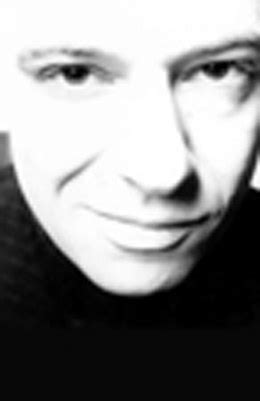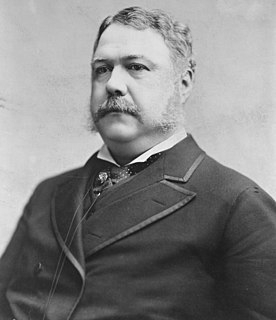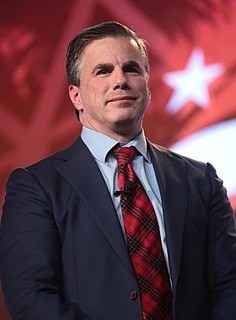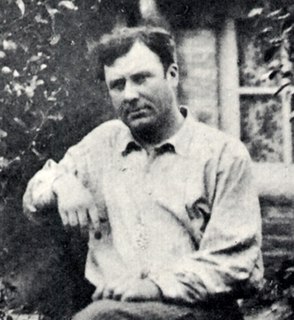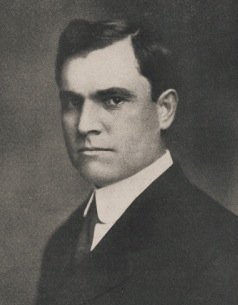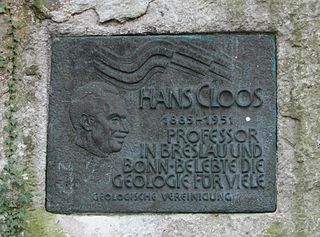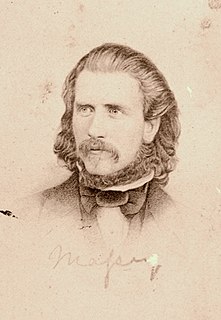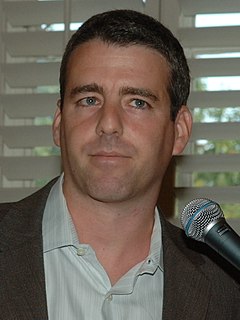Top 428 Documents Quotes & Sayings - Page 7
Explore popular Documents quotes.
Last updated on April 21, 2025.
News at Work is a vivid, inside look at the collision of print journalism and electronic media. Based on close access to the leading news organizations in Buenos Aires, Boczkowski documents how contemporary journalism is caught in the grip of emulation; this spiral of imitation exacerbated further by global news media and their intensifying homogenization. The portrait of this transformation of the news is both fascinating and deeply worrying, and is guaranteed to provoke debate.
Machines already are much smarter than us at so many things. I mean, try to multiply two 10-digit numbers with each other or, you know, sift through a thousand documents. So there's lots of things that machines are better at including in mental task than us. There's many more that they're not as good at, but the direction is pretty obvious and the progress is clear.
By virtue of the standing and prestige of President Ben-Zvi, some 3,000 manuscripts originating from Arab lands, some of them of major significance, have been deposited at the Ben-Zvi Institute. In contrast to the Aleppo Codex, most of these documents were donated willingly, in the confidence that the institute would protect and preserve them.
Stephen Colbert's recent comment is apropos: When the Republican legislature of North Carolina responded to a scientific study predicting a threatening rise in sea level by barring state and local agencies from developing regulations or planning documents to address the problem, Colbert responded: "This is a brilliant solution. If your science gives you a result that you don't like, pass a law saying the result is illegal. Problem solved."
If I were in Congress in 1996, I would have voted for the Defense of Marriage Act, which used Congress's constitutional authority to define what official state documents other states have to recognize under the Full Faith and Credit Clause, to ensure that no state would be forced to recognize a 'same sex' marriage license issued in another state.
The quotes are often poignant or funny (one man before the firing squad requests a bulletproof vest) and often don't register as much more than interesting historical documents from centuries past. But read in aggregate, all that pain piles up. Essentially, Elder has amassed a collection of what people say when they know they are going to die, the final product of what could be seen as psychological torture.
Slavery was a central concern of governance form the time of the first nation-state. The Code of Hammurabi, the earliest know set of laws for governing an empire, prescribed death for anyone who harbored a fugitive or otherwise helped a slave to escape. The relationship between the law and bondage goes back even farther: Indeed, the oldest extant legal documents don't concern the sale of land, houses, or even animals, but slaves.
Well, almost everything is open - the political documents, the (unintelligible) of cabinet meetings. What has been opened now and what had been closed are things that many governments still close, and that is police files and trial records, trial records of the special courts set up by Vichy. And especially interesting are the trial records of the Purge Trials after the war.
I guess the main thing that came out of the Panama Papers was that Ukrainian President Poroshenko had promised to divest of his chocolate company and instead, he simply moved it into an offshore account. And on the very day that he was increasing the attacks on the eastern Donbass region of Ukraine, the export sector, he was signing documents to conceal his own money offshore. So the exposé of the Panama money laundering has hit some of the dictators that America is protecting and promoting.
Saigon, U.S.A. aptly documents the birth of a new American community, uprooted in the aftermath of war and forever torn apart by the wounds of the past, yet one capable of healing against all odds. An engrossing yet succinct film that captures not only a major incident in Vietnamese American life, but also an important chapter of American history. A profound film that manages to confront us with the deepest sorrow while allowing us to be hopeful about what it means to be human.
For many years I have lived with a secret, in a secrecy imposed on all specialists in astronautics. I can now reveal that every day, in the USA, our radar instruments capture objects of form and composition unknown to us. And there are thousands of witness reports and a quantity of documents to prove this, but nobody wants to make them public. Why? Because authority is afraid that people may think of God knows what kind of horrible invaders. So the password still is: We have to avoid panic by all means
The First Amendment reads more like a dream than a law, and no other nation, so far as I know, has been crazy enough to include such a dream among its fundamental legal documents. I defend it because it has been so successful for two centuries in preserving our freedom and increasing our vitality, knowing that all arguments in support of it are certain to sound absurd.
As for not getting things right: I constantly rerun social situations/conversations I experience/have throughout my head, and I'm always writing them down in notebooks or in word documents/the Internet. I feel like these habits and a generally good memory of people/the interactions I have with them (due to studying people having always been my main interest in life) have lead me to being very accurate in things I write in stories/essays.
There is progress in the sense that the Prime Minister [Shinz? Abe] has proposed, outlined, as it were, directions for movement toward a peace treaty and the resolution of issues related to territorial problems. Now, what did he propose? He proposed promoting an environment of trust and cooperation. I believe it is even hard to imagine that it can be any different, that we can agree to sign the documents that we are talking about without trusting each other or without cooperation. That is simply impossible even to imagine.
Joel Lane documents a life we don’t quite live, in a city we can’t quite find: half glimpsed and half imagined, we know it’s out there somewhere. Waiting, maybe. Mixing fear with desire, reputation with regret. Touching the blood-beat of our secret hunger with the rhythms of a music that never felt alien till now. Wasted lives, with never a wasted word. It’s an extraordinary achievement: vivid as neon, real as rain. Devastating.
I have an oscillating fan at my house. It goes back and forth. It looks like the fan is saying "no." So I like to ask it questions that a fan would say "no" to! Do you keep my hair in place? Do you keep my documents in order? Do you have 3 settings? LIAR! My fan lied to me. Now I will pull the pin up. Now you're not saying ANYTHING!
Let us not compare Edward Snowden's situation with that of Chelsea Manning or Jeremy Hammond, who is also imprisoned in the United States. As a result of WikiLeaks' hard work, Edward Snowden has political asylum, has travel documents, lives with his girlfriend, goes to the ballet and earns substantial speaking fees. Edward Snowden is essentially free and happy. That is no coincidence. It was my strategy to undo the chilling effect of the 35 year Manning sentence and it has worked.
We [with Shindzo Abe] should understand that the results of that terrible tragedy of the 20th century, namely World War II, are enshrined in corresponding international documents, and finding a way to settle all disputes without destroying the entire foundation of international law that evolved as a result of World War II is a highly delicate task. Therefore, I would like to reiterate that we cannot second-guess the course, let alone the outcome of our negotiations.
Your medical documents will say Acquired Immune Deficiency Syndrome that is AIDS. What that means you have got this challenge of immune deficiency. Alright what causes immune deficiency? HIV. Alright. Is that all that causes immune deficiency? The medical textbooks will say there are other things that cause immune deficiency. There is also genetic immune deficiency that is a different phenomenon.
It can be a good thing if deeper theology, or philosophy, only makes one more uncertain. It may lead to a healthy doubt; he may throw his hands up saying, 'God, I just don't know anymore. If you're out there, I'm giving it all to you.' From there, after the surrender, he is allowing God himself, rather than theories, books, and documents, to take over and lead him into all truth.
Ultimately it's a snowboarding film [Fourth Phase], of course, so the main thing that we wanted to celebrate was how awesome snowboarding is! Secondly, we wanted to celebrate the environment that we all shape our lives around. So the film documents myself and other like-minded individuals attempting to follow the hydrological cycles that shape the worlds we've committed our lives to.
I did attempt to find out if there were any secret government documents that revealed things. If there were, they were concealed from me too. And if there were, well I wouldn't be the first American president that underlings have lied to, or that career bureaucrats have waited out. But there may be some career person sitting around somewhere, hiding these dark secrets, even from elected presidents. But if so, they successfully eluded me...and I'm almost embarrassed to tell you I did (chuckling) try to find out.
My favorite type of photography - apart from fashion photography - is journalism, which in a way documents something that exists in a very precise moment, that didnt exist in a moment before and will not exist ever again. This has influenced my work a lot - I usually try to make my images look like they just exist, like no effort was put into it.
How do we fill the need for technology workers, people who have computer skills and math and science skills? How do we get a more diverse science workforce? These are all issues - I would look at these documents that were from the '50s and '60s and '70s, and you'd swear they were written two weeks ago because the issues are the same.
Utopian fiction is really boring. I had to read a lot of it, and it's not that much fun. But they're fascinating to me as historical documents. Cabet [Icaria's founder and author of the utopian novel, Travels in Icaria], is writing in the 1830s, and his idea of the perfect society reveals a lot about his time. But his book is uniquely bad.
My favorite method of encryption is chunking revolutionary documents inside a mess of JPEG or MP3 code and emailing it off as an "image" or a "song." But besides functionality, code also possesses literary value. If we frame that code and read it through the lens of literary criticism, we will find that the past hundred years of modernist and postmodernist writing have demonstrated the artistic value of similar seemingly arbitrary arrangements of letters.
Why was the United States so afraid of an independent South Vietnam? Well, I think the reason again is pretty clear from the internal government documents. Precisely what they were afraid of was that the "takeover" of South Vietnam by nationalist forces would not be brutal. They feared it would be conciliatory and that there would be successful social and economic development - and that the whole region might work.
When we talk about defending Muslims, defending women, we're automatically by default excluding someone, but when we talk about defending liberty, when we talk about defending the freedoms that are enshrined within our founding documents, that is inclusive of every American. That's a message the American left needs to learn as we move forward.
If you look at US internal documents, they explain very clearly what the threat of Cuba was. So, back in the early 1960s the State Department described the threat of Cuba as Castro's successful defiance of US policy, going back to the Monroe Doctrine. The Monroe Doctrine established the US claim to dominate the Western hemisphere and Castro was successfully defying that. That's not tolerable. It is like somebody saying "let's have democracy in Greece," and we just can't tolerate that so we have to destroy the threat at its roots.
It was an easy decision for me which books to self-publish as ebooks. I got the rights back to two Avon books that I wrote at the start of my career. I paid to have these two books, 'Bold Conquest' and 'Wild Hearts,' scanned. When I got them back as documents, I had to clean them up and correct all the typos, etc.
I believe that there have been repeated attempts to influence prices in the silver markets. There have been fraudulent efforts to persuade and deviously control that price. Based on what I have been told by members of the public, and reviewed in publicly available documents, I believe violations to the Commodity Exchange Act (CEA) have taken place in silver markets and that any such violation of the law in this regard should be prosecuted.
So here we have found a means of a) alienating even the most flexible and patient Palestinians; while b) frustrating the efforts of the more principled and compromising Israelis; while c) empowering and financing some of the creepiest forces in American and Israeli society; and d) heaping ordure on our own secular founding documents. When will the Justice Department and the Congress and the Supreme Court become aware of this huge and rank offense, which is designed to bring us ever nearer to holy war?
At its heart, this book touches on a mystery of economics: what exactly is happening in our world, and why does it often work so well? As the authors show, apparently messy systems - such as untidy desks - actually exhibit a high degree of order: the piles of paper are close to hand, and the most important documents tend to make their way to the top while un-needed ones sink to the bottom. If the mess works, why mess with it?
There are by now declassified documents from the 1950s that tells you a lot about what's going on in Egypt and we should have known it then. It's about exactly what's happening, how we can disregard public opinion as long as the dictators we support are capable of suppressing their populations. So to hell with public opinion. That's all right there in the 1950's. That's not security. That's not security of the government. That's, if anything, security from its own population. And there's a lot of that.
The Constitution and the Bill of Rights we designed to get the government off the backs of the people -- all the people. Those great documents guarantee to us all the rights to personal and spiritual self-fulfillment. But that guarantee is not self-executing. As nightfall does not come all at once, neither does oppression. In both instances, there is a twilight when everything remains seemingly unchanged. And it is in such a twilight that we all must be most aware of the change in the air -- however slight -- lest we become unwitting victims of the darkness.
Indiana was really, I suppose, a Democratic State. It has always been put down in the book as a state that might be carried by a close and careful and perfect organization and a great deal of [from audience: "soap," in reference to purchased votes, the word being followed by laughter]. I see reporters here, and therefore I will simply say that everybody showed a great deal of interest in the occasion, and distributed tracts and political documents all through the country.
There were over 40,000 pages of FBI documents of which only about half are currently available to scholars and researchers. I think that this 40th anniversary of the assassination is a good opportunity for us to say that now is the time to declassify all FBI material on Malcolm X. There really is a need for us to challenge the US government for its refusal to open up its own archives 40 years after the death of Malcolm.
The U.S. Government hasn't maintained secrecy regarding UFOs. It's been leaking out all over the place. But the way it's been handled is by denial, by denying the truth of the documents that have leaked. By attempting to show them as fraudulent, as bogus of some sort. There has been a very large disinformation and misinformation effort around this whole area. And one must wonder, how better to hide something out in the open than just to say, 'It isn't there. You're deceiving yourself if you think this is true.' And yet, there it is right in front of you.
Behold our refutation of the error. It is not based on documents of faith, but on the reasons and statements of the philosophers themselves. If then anyone there be who, boastfully taking pride in his supposed wisdom, wishes to challenge what we have written, let him not do it in some corner nor before children who are powerless to decide on such difficult matters. Let him reply openly if he dare. He shall find me there confronting him, and not only my negligible self, but many another whose study is truth.
If the American people had known the truth - that Barack Obama, Hillary Clinton and other top administration officials knew that the Benghazi attack was an al-Qaida terrorist attack from the get-go - and yet lied and covered this fact up - Mitt Romney might very well be president. These documents also point to connection between the collapse in Libya and the ISIS war - and confirm that the U.S. knew remarkable details about the transfer of arms from Benghazi to Syrian jihadists.
For more than twenty years by my own work and personal initiative, I have gathered from all the old streets of Vieux Paris photographic plates, 18 x 24 format, artistic documents of the beautiful civil architecture of the 16th to the 19th century: the old hôtels, historic or curious houses, beautiful facades, beautiful doors, beautiful woodwork, door knockers, old fountains This vast artistic and documentary collection is today complete. I can truthfully say that I possess all of Vieux Paris.
I was working on a satirical novel about a charismatic preacher who takes over a small Indiana town. Then I remembered Jim Jones was from Indiana and Googled him. I learned that the FBI had recently released all the documents that agents collected from Jonestown after the massacre - over 50,000 pieces of paper and almost 1,000 audio tapes. I started reading the files and couldn't tear myself away; I find "true" stories inherently more powerful than fiction.
It is not strange that men of note and learning, attracted by the wealth of symbolism on Masonry, as well as by its spirit of fraternity perhaps, also by its secrecy began at an early date to ask to be accepted as members of the order; hence Accepted Masons. How far back the custom of admitting such men to the Lodge goes is not clear, but hints of it are discernable in the oldest documents of the order.
There's never been a nation like the United States, ever. It begins with the principles of our founding documents, principles that recognize that our rights come from God, not from our government - principles that recognize that because all of us are equal in the eyes of our creator, all life is sacred at every stage of life.
Often, I'm spending months with a person in a very intimate context, getting to know the ins and outs of what they ate for breakfast, not to mention dredging up the most traumatic experiences of their lives, digging through their documents and photographs from difficult times, all of that. And that process, I think, can be extraordinarily strange for subjects who've never been interviewed before, especially if you don't acquaint them from the get-go with what you're trying to do, what it entails, and why you care.
For me, it is about using everything that is there and using the gaps in the record, figuring out why the gaps might be there. And then when you move on to the level of what historians said, laying the interpretations side by side. You also have to look back at the documents and make your own judgments. What the record says and what people say about it. A novelist can fill the gaps in a way that a biographer cannot.
For a billion years the patient earth amassed documents and inscribed them with signs and pictures which lay unnoticed and unused. Today, at last, they are waking up, because man has come to rouse them. Stones have begun to speak, because an ear is there to hear them. Layers become history and, released from the enchanted sleep of eternity, life's motley, never-ending dance rises out of the black depths of the past into the light of the present.
Authority can mean different things to different people. For example, some document or other may be authoritative for particular group even though it's not reliable. It's just that the group has accepted that document as authoritative for their group. And some documents are truthful and reliable but they are ignored, so they have no authority for that particular group.
Christianity was neither original nor unique, but that the roots of much of the Judeo/ Christian tradition lay in the prevailing Kamite (ancient Egyptian) culture of the region. We are faced with the inescapable realization that if Jesus had been able to read the documents of old Egypt, he would have been amazed to find his own biography already substantially written some four or five thousand years previously.
Congress actually authorized the printing and payment for a Bible. That illustrates the high regard that the Bible was held in early American society. We see biblical ideas woven into the founding documents of our country like the Declaration of Independence and the Constitution. The Declaration of Independence explicity states "that all men are created equal, that they are endowed by their Creator with certain unalienable Rights..." This is a biblical idea stemming from the dignity of all people - Psalm 139:14 - we are fearfully and wonderfully made.
Pope John Paul II himself was kind of a rather independent, creative man. I remember being told by somebody who worked very close with him in preparation for his first visit to the United States in 1979, he studied our normative documents, Declaration of Independence, the Federalist Papers, the Constitution. And he was amazed. He called his priests first
thing in the morning and he said, he said, I thought America was a pagan country.
... for nearly 40 years, while producing the now-banned industrial coolants known as PCBs at a local factory, Monsanto Co. routinely discharged toxic waste into a west Anniston creek and dumped millions of pounds of PCBs into oozing open-pit landfills. And thousands of pages of Monsanto documents-many emblazoned with warnings such as "CONFIDENTIAL: Read and Destroy"-show that for decades, the corporate giant concealed what it did and what it knew.
A: Snowden has enough information to cause more damage to the US government in a minute alone than anyone else has ever had in the history of the United States. But that's not his goal. [His] objective is to expose software that people around the world use without knowing what they are exposing themselves without consciously agreeing to surrender their rights to privacy. [He] has a huge number of documents that would be very harmful to the US government if they were made public.
There is a comfort with design that may be a detail, rather than a building; comfort with form that is time-released and never finished. How do you represent an instruction set that will play out in time? There may be slightly different kinds of documents for representing those forms, and different skills for advocating change outside of our fee-for-service habits.
Ours was the first revolution in the history of mankind that truly reversed the course of government, and with three little words: 'We the people.' 'We the people' tell the government what to do, it doesn't tell us. 'We the people' are the driver, the government is the car. And we decide where it should go, and by what route, and how fast. Almost all the world's constitutions are documents in which governments tell the people what their privileges are. Our Constitution is a document in which 'We the people' tell the government what it is allowed to do. 'We the people' are free.
Snowden is almost preternaturally prepossessing and self-possessed. I think of a novelist whose dream character just walks into his or her head. It must have been like that with you and Snowden. But what if he'd been a graying guy with the same documents and far less intelligent things to say about them? In other words, how exactly did who he was make your movie and remake our world?
In India, [in] the great documents like [the] Upanishads in eighth century B.C., you find some of the wisest [women] making great, learned speeches and then you worship them, but actually don't do very much about girls' education generally. So I think there has been a kind of dual presence of pain, respect, and saying you are great, etc., but not providing the basic facilities that make women able to lead the kind of life that they would like to and that men easily do.







